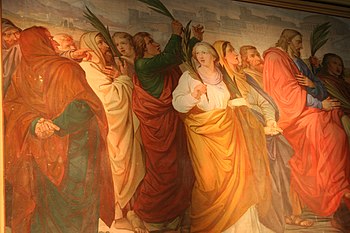
English: Description: Left Apsis: Jesus entering Jerusalem on Palm Sunday. Fresco in the Parish Church of Zirl, Austria. (Photo credit: Wikipedia)
Holy week begins with the sixth Sunday in Lent. This Sunday observes the triumphal entry of Jesus into Jerusalem that was marked by the crowds who were in Jerusalem for Passover waving palm branches and proclaiming him as the messianic king. The Gospels tell us that Jesus rode into the city on a donkey, enacting the prophecy of Zechariah 9:9 and in so doing emphasized the humility that was to characterize the Kingdom he proclaimed. The irony of his acceptance as the new Davidic King (Mark 11:10) by the crowds who would only five days later cry for his execution should be a sobering reminder of the human tendency to want God on our own terms.
Traditionally, worshippers enact the entry of Jesus into Jerusalem by the waving of palm branches and singing songs of celebration. Sometimes this is accompanied by a processional into the church.
This Sunday is also known as Passion Sunday to commemorate the beginning of Holy Week and Jesus’ final agonising journey to the Cross. The English word passion comes from a Latin word that means ‘to suffer,’ the same word from which we derive the English word patient.
In most Protestant traditions, the liturgical colour for The Season of Lent is purple, and that colour is used until Easter Sunday. In Catholic tradition (and some others), the colours are changed to Red for Palm Sunday. Red is the colour of the church, used for Pentecost as well as remembering the martyrs of the church. Since it symbolizes shed blood, it is also used on Palm Sunday to symbolize the death of Jesus. While most Protestants celebrate the Sunday before Easter as Palm Sunday, in Catholic and other church traditions it is also celebrated as Passion Sunday anticipating the impending death of Jesus. In some Church traditions (Anglican), the church colours are changed to red for the fifth Sunday in Lent, with the last two Sundays observed as Passiontide.
Increasingly, many churches are incorporating an emphasis on the Passion of Jesus into services on Palm Sunday as a way to balance the celebration of Easter Sunday.




